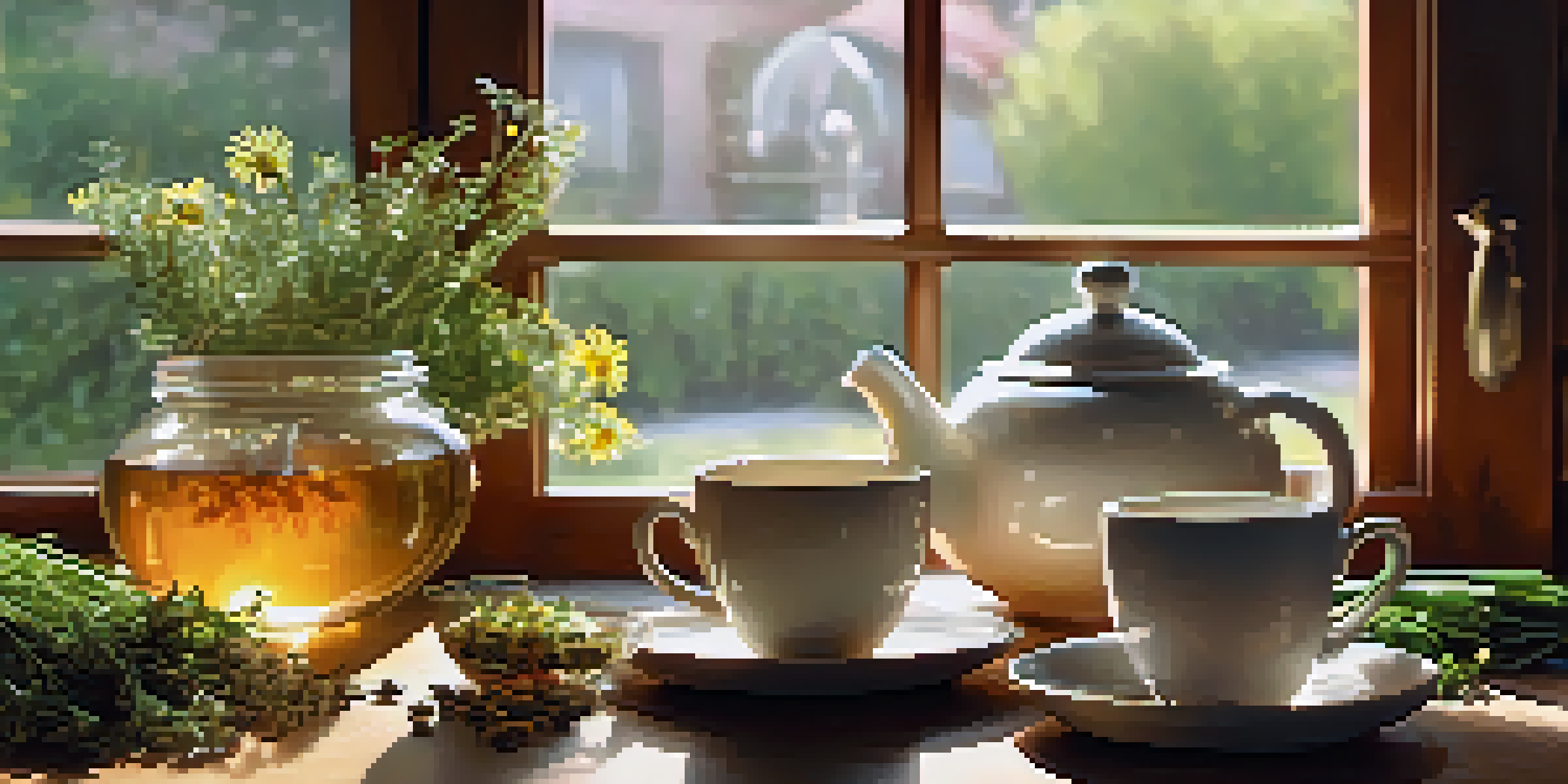Herbal Remedies: A Natural Approach to Everyday Health

Understanding Herbal Remedies and Their Benefits
Herbal remedies are natural solutions derived from plants, used for centuries to promote health. They can range from teas and tinctures to capsules and powders, each offering unique benefits. Unlike conventional medicine, which often focuses on treating symptoms, herbal remedies aim to support the body's overall well-being.
Herbs are the friend of the physician and the medicine of the people.
For instance, chamomile tea is well-known for its calming properties, making it a popular choice for those seeking relief from stress or insomnia. Similarly, ginger is frequently used to soothe digestive issues, showcasing the wide array of uses for these natural solutions. By incorporating herbal remedies, you can take a proactive approach to your health.
It's important to note that while many herbal remedies are generally safe, they can interact with medications. Therefore, it's wise to consult with a healthcare professional before starting any new herbal regimen.
Popular Herbal Remedies for Everyday Ailments
When it comes to addressing everyday health concerns, several herbal remedies have stood the test of time. For example, peppermint tea can be a go-to for headaches, while echinacea is often recommended for boosting the immune system. These remedies are not just popular; they are also supported by some scientific studies that highlight their effectiveness.

Another favorite is turmeric, known for its anti-inflammatory properties. Many people add it to smoothies or golden milk for a delicious health boost. Similarly, honey and lemon, often combined in a soothing drink, can help alleviate sore throats, making them staples in many households.
Herbal Remedies Support Overall Health
Herbal remedies, derived from plants, promote health by addressing various ailments and enhancing overall well-being.
These remedies are easily accessible and can be incorporated into your daily routine, making it simple to enhance your health naturally.
How to Incorporate Herbal Remedies into Your Routine
Integrating herbal remedies into your daily life doesn't have to be complicated. Start with small changes, like swapping your morning coffee for herbal tea, or adding fresh herbs to your meals. For instance, basil not only adds flavor but also provides antioxidants, making it a win-win for your taste buds and health.
Let food be thy medicine and medicine be thy food.
You can also explore herbal supplements, which are available in various forms such as capsules and extracts. Just be sure to choose high-quality products from reputable sources to ensure safety and effectiveness. Reading labels and researching brands can make a significant difference.
Lastly, consider keeping a journal to track how different remedies affect your health. This can help you find what works best for you and make the process more personalized.
The Role of Herbal Remedies in Preventive Health
Preventive health is all about taking proactive steps to avoid illness, and herbal remedies play a significant role in this approach. By using herbs that support immune function, digestion, and stress management, you can strengthen your body's defenses. For example, adaptogens like ashwagandha can help the body cope with stress, potentially preventing stress-related health issues.
Additionally, many herbal remedies, like garlic, are known for their cardiovascular benefits. Regularly including these in your diet can contribute to long-term heart health. It’s a natural way to support your body before issues arise.
Safety is Key with Herbal Use
While generally safe, it's crucial to consult healthcare professionals before using herbal remedies to avoid potential interactions with medications.
This preventive mindset not only encourages you to take charge of your health but also fosters a deeper connection with nature.
Safety Considerations When Using Herbal Remedies
While herbal remedies are generally safe, it's essential to approach them with caution. Some herbs can cause allergic reactions or interact with prescription medications. For example, St. John's Wort, often used for depression, can interfere with the effectiveness of birth control pills.
To ensure safety, always consult with a healthcare provider, especially if you’re pregnant, nursing, or have existing health conditions. They can provide personalized advice and help you navigate any potential risks.
Being informed about the herbs you choose is crucial. Research reputable sources and consider starting with small doses to monitor your body's response.
The Future of Herbal Remedies in Modern Medicine
The resurgence of interest in herbal remedies reflects a growing trend towards holistic health approaches. As people seek alternatives to synthetic medications, many healthcare professionals are starting to recognize the value of integrating herbal treatments into traditional practices. This shift could lead to a more balanced approach to health.
Moreover, ongoing research is shedding light on the efficacy of various herbs, paving the way for potential new therapies. For instance, studies on the anti-inflammatory properties of curcumin, found in turmeric, are gaining traction in the medical community.
Integrating Herbs into Daily Life
Incorporating herbal remedies into your routine can be simple, such as replacing coffee with herbal tea or adding fresh herbs to meals.
As we look to the future, the combination of modern medicine and traditional herbal wisdom may offer exciting possibilities for enhancing health and wellness.
Embracing a Holistic Approach to Wellness
Ultimately, embracing herbal remedies is about adopting a holistic mindset towards health. This means considering not just the physical aspects of well-being but also emotional and spiritual health. Herbal remedies can support this balance by promoting relaxation, enhancing mood, or even encouraging mindfulness.
For example, incorporating rituals around herbal teas can create moments of calm in a busy day, allowing you to pause and reflect. This practice can enhance your overall experience of wellness, making it more than just a physical state.

As you explore herbal remedies, remember that the journey to wellness is personal. Pay attention to what resonates with you and enjoy the process of discovery.